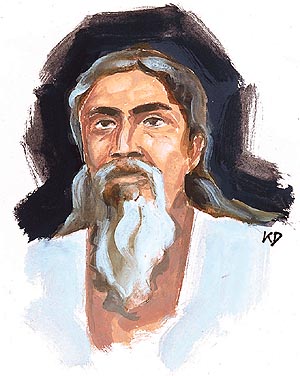HAD Sri Aurobindo boarded the ill-fated steamer that sank on its way to India from England in 1893, Dr. Krishna Dhan Ghose would have lost his dear son, and India a great revolutionary, poet, philosopher, yogi and saint. It is rather ironical that the opposite happened. Dr Krishna Dhan Ghose could not take the news of the supposed death of his son, and before he could be told that Sri Aurobindo was not on the steamer, he died of a heart attack. He was denied the pleasure of seeing his son flower into one of the great thinkers of modern India.
 Most of us remember Sri Aurobindo from his latter photographs that portary him as a fragile, harmless, saintly figure. Many will be surprised to learn that the man who devoted most of his life of Vedanta in his Pondicherry ashram, was once a firebrand revolutionary intent on winning freedom for his motherland.
Most of us remember Sri Aurobindo from his latter photographs that portary him as a fragile, harmless, saintly figure. Many will be surprised to learn that the man who devoted most of his life of Vedanta in his Pondicherry ashram, was once a firebrand revolutionary intent on winning freedom for his motherland.
When the Moderates were trying to negotiate some sort of autonomy from the British, Sri Aurobindo advocated Purna Swaraj — total freedom and nothing less than that, because to 'be content with the relations of master and dependant or superior and subordinate, would be a mean and pitiful aspiration unworthy of manhood; to strive for anything less than a strong and glorious freedom would be to insult the greatness of our past and the magnificent possibilities of our future'. And Sri Aurobindo did not disapprove of armed struggle if the situation demanded it. Aggression, in his view, is unjust only when unprovoked, and violence is unrighteous when used without thought or for unrighteous ends. It is foolish to apply the philosophy of Ahimsa to all situations. Besides violence has its place in society, the 'sword of the warrior is as necessary to the fulfilment of justice and righteousness as the holiness of the saint. Ramdas is not complete without Shivaji'.
The British jailed Sri Aurobindo for revolutionary activities. They imprisoned his body, but unwittingly set his soul free, for it was during his year-long jail sentence that he is supposed to have had Visvarupa Darshan or the experience of the Cosmic Consciousness, and from then on he was a totally different man.
1 comment:
Aurobindo is the antidote to Gandhi's namby-pamby non-violence. The approach of non-violence worked in the case of India only because the British were not as cold-blooded as some of India's current enemies are. Imagine if India had revolutionaries of the calibre of Aurobindo today.
Post a Comment